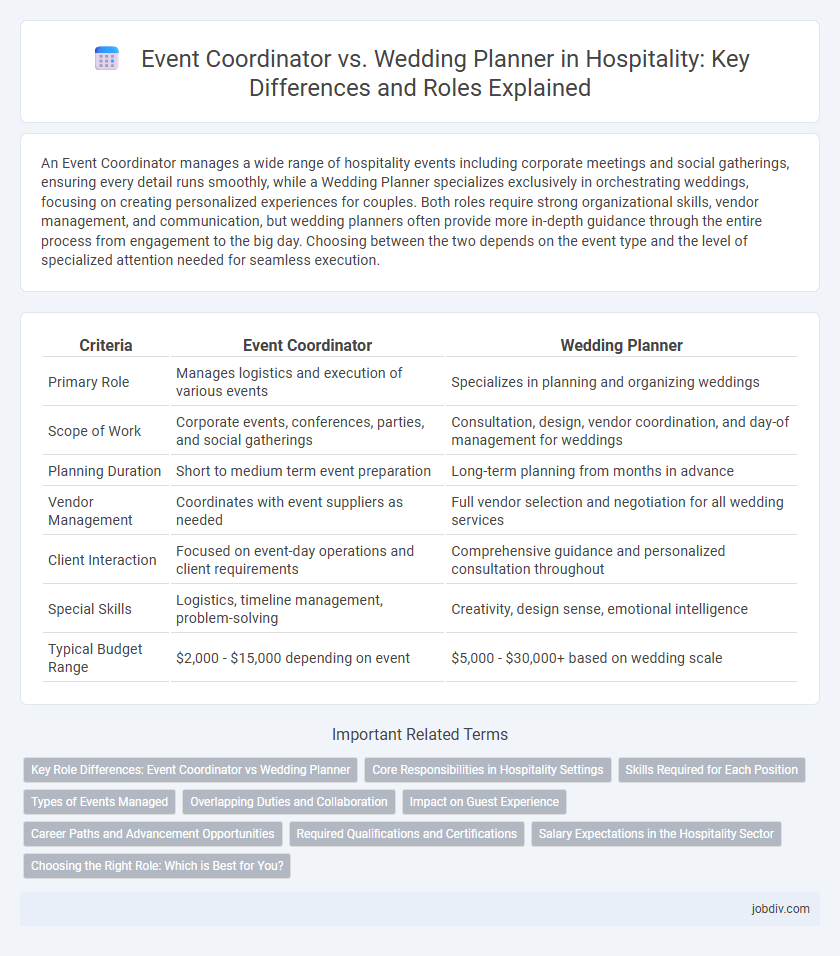An Event Coordinator manages a wide range of hospitality events including corporate meetings and social gatherings, ensuring every detail runs smoothly, while a Wedding Planner specializes exclusively in orchestrating weddings, focusing on creating personalized experiences for couples. Both roles require strong organizational skills, vendor management, and communication, but wedding planners often provide more in-depth guidance through the entire process from engagement to the big day. Choosing between the two depends on the event type and the level of specialized attention needed for seamless execution.
Table of Comparison
| Criteria | Event Coordinator | Wedding Planner |
|---|---|---|
| Primary Role | Manages logistics and execution of various events | Specializes in planning and organizing weddings |
| Scope of Work | Corporate events, conferences, parties, and social gatherings | Consultation, design, vendor coordination, and day-of management for weddings |
| Planning Duration | Short to medium term event preparation | Long-term planning from months in advance |
| Vendor Management | Coordinates with event suppliers as needed | Full vendor selection and negotiation for all wedding services |
| Client Interaction | Focused on event-day operations and client requirements | Comprehensive guidance and personalized consultation throughout |
| Special Skills | Logistics, timeline management, problem-solving | Creativity, design sense, emotional intelligence |
| Typical Budget Range | $2,000 - $15,000 depending on event | $5,000 - $30,000+ based on wedding scale |
Key Role Differences: Event Coordinator vs Wedding Planner
Event coordinators primarily manage logistics and day-of execution, ensuring that all vendors and schedules run smoothly for a variety of events. Wedding planners offer comprehensive services including design, budgeting, vendor selection, and detailed planning from start to finish, specializing exclusively in weddings. The key role difference lies in the broader scope of wedding planning versus the focused, operational support provided by event coordinators.
Core Responsibilities in Hospitality Settings
Event coordinators in hospitality manage logistical aspects such as venue setup, vendor coordination, and guest services to ensure smooth event execution. Wedding planners specialize in designing and personalizing ceremonies, focusing on aesthetics, theme development, and client preferences to create memorable wedding experiences. Both roles require strong organizational skills, but event coordinators emphasize operational efficiency while wedding planners prioritize creative vision in hospitality settings.
Skills Required for Each Position
Event coordinators require strong organizational skills, attention to detail, and the ability to manage multiple vendors and logistics simultaneously, ensuring seamless execution of conferences, corporate events, and social gatherings. Wedding planners need excellent interpersonal skills, creativity, and emotional intelligence to handle client relationships, customize ceremonies, and coordinate bridal parties effectively. Both roles demand exceptional time management and problem-solving abilities to adapt quickly and meet client expectations in the dynamic hospitality industry.
Types of Events Managed
Event coordinators manage a wide range of gatherings including corporate conferences, trade shows, fundraisers, and private parties, emphasizing logistics and operational details. Wedding planners specialize exclusively in weddings, handling everything from venue selection and vendor coordination to ceremony design and timeline creation. The scope of a wedding planner is highly focused, whereas event coordinators possess versatile expertise applicable to various event types.
Overlapping Duties and Collaboration
Event Coordinators and Wedding Planners both manage logistics such as venue selection, vendor coordination, and timeline creation to ensure seamless event execution. Their overlapping duties include budget management, client communication, and problem-solving on the day of the event. Collaboration between these professionals enhances customized experiences, combining strategic planning with creative design to meet client expectations.
Impact on Guest Experience
Event coordinators ensure smooth logistics and timely execution, enhancing guest comfort and engagement through meticulous planning and communication. Wedding planners craft personalized, immersive experiences by managing aesthetics, vendor coordination, and emotional flow, creating memorable moments for attendees. Both roles significantly influence guest satisfaction, with coordinators focusing on operational excellence and planners emphasizing creative ambiance.
Career Paths and Advancement Opportunities
Event Coordinators typically manage a wide range of events like corporate meetings, conferences, and social gatherings, offering diverse experience that can lead to roles such as Event Manager or Marketing Coordinator. Wedding Planners specialize in bridal events, developing niche expertise that can advance into luxury wedding planning, destination event management, or launching a personalized wedding consulting business. Both careers offer opportunities for growth through certifications, client portfolio expansion, and mastery of negotiation and vendor management skills.
Required Qualifications and Certifications
Event coordinators typically require strong organizational skills and a bachelor's degree in hospitality, communications, or related fields, with certifications like Certified Meeting Professional (CMP) enhancing credibility. Wedding planners often benefit from specialized training in wedding coordination, with certifications such as the Wedding Planning Institute's Certified Wedding Planner (CWP) or the Association of Bridal Consultants (ABC) certification highlighting expertise. Both roles value hands-on experience, but event coordinators generally emphasize broader event management qualifications while wedding planners focus on niche certification in matrimonial events.
Salary Expectations in the Hospitality Sector
Event coordinators in the hospitality sector typically earn between $40,000 and $60,000 annually, reflecting their role managing a variety of events such as corporate meetings and conferences. Wedding planners often command higher salaries, ranging from $50,000 to $75,000 or more, due to the specialized skills and emotional investment required for personalized wedding experiences. Salary expectations can vary based on geographic location, experience level, and the scale of events managed within the hospitality industry.
Choosing the Right Role: Which is Best for You?
Choosing between an event coordinator and a wedding planner depends on the scope and specialization of services desired. Event coordinators typically manage logistics for various event types, ensuring smooth execution, while wedding planners focus exclusively on creating personalized wedding experiences from start to finish. Prioritizing your specific needs, such as detailed vendor management or comprehensive design planning, will help determine which role aligns best with your vision and budget.
Event Coordinator vs Wedding Planner Infographic

 jobdiv.com
jobdiv.com